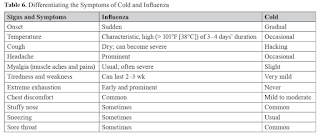Seasonal Influenza
Introduction
Influenza (flu) is an acute respiratory illness caused by influenza A or B viruses that occurs mainly during the winter season.
- The typical incubation period is 1-4 days (average 2 days).
Symptoms
Seasonal influenza is characterized by a sudden onset of fever, cough (usually dry), headache, muscle and joint pain, severe malaise (feeling unwell), sore throat and a runny nose.
- Although most people recover within a week without requiring medical attention, influenza can cause severe illness or death especially in individuals at high risk of flu complications.
Treatment
Symptomatic management is recommended for patients with uncomplicated seasonal influenza, including
- Maintaining hydration
- Using paracetamol or NSAIDs for fever, headache and myalgia.
- If symptomatic, stay home to minimize the risk of infecting others in the community.
NOTE: For outpatients with uncomplicated influenza, early antiviral treatment (within 48 hours of symptom onset) may be associated with a modest reduction in duration of illness (by approximately 24 hours). Such limited benefit must be balanced against the potential adverse effects of antiviral treatment, including nausea, vomiting, headaches and neuropsychiatric events.
Regardless of symptom duration, antiviral treatment (neuraminidase inhibitors e.g. oseltamivir or zanamivir) is indicated in patients with confirmed or suspected influenza with the following conditions:
- Hospitalized patients
- Outpatients with severe or progressive illness
- Outpatients at high risk of complications
- Patients younger than 2 years or 65 years and older
- Patient with medical conditions such as asthma, diabetes mellitus, heart disease, blood disorders, kidney diseases and liver disorders
- Pregnant women and those within 2 weeks postpartum
- Immunosuppressed patients such as HIV, receiving chemotherapy
- Obese
- Residents of nursing homes and long-term care facilities.
Hospitalization is warranted for patients with significant dehydration and for severely ill patients, especially those with respiratory distress, hypoxemia, impaired cardiopulmonary function or altered mental status.
Prevention
The most effective way to prevent the disease is vaccination. WHO recommends annual vaccination for
- Pregnant women at any stage of pregnancy
- Children aged between 6 months to 5 years
- Elderly individuals (aged more than 65 years)
- Individuals with chronic medical conditions
- Health-care workers.
Personal protective measures include
- Regular hand washing
- Good respiratory hygiene – covering mouth and nose when coughing or sneezing, using tissues and disposing of them correctly
- Early self-isolation of those feeling unwell
- Avoiding close contact with sick people
- Avoiding touching one's eyes, nose or mouth
Neuraminidase inhibitors can be used for postexposure prophylaxis of influenza (e.g. individuals at higher risk of poor outcomes from influenza or for institutional outbreaks) when vaccination is contraindicated, or when the circulating strain is not covered by the annual vaccine.
- Postexposure prophylaxis should be started as soon as possible after exposure, within 48 hours.

Comments
Post a Comment